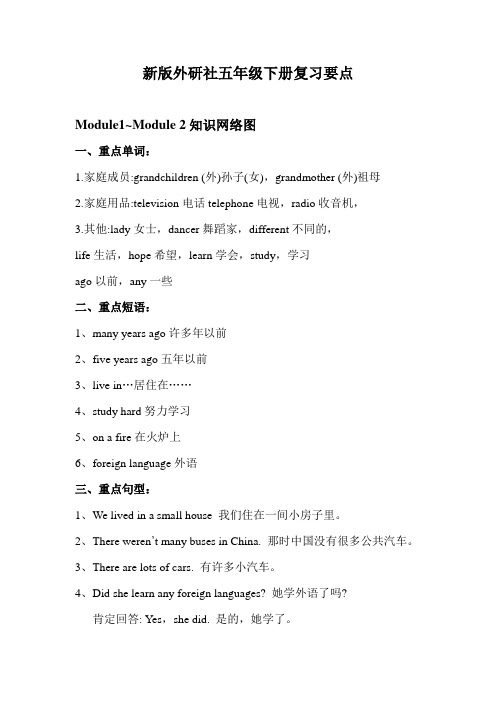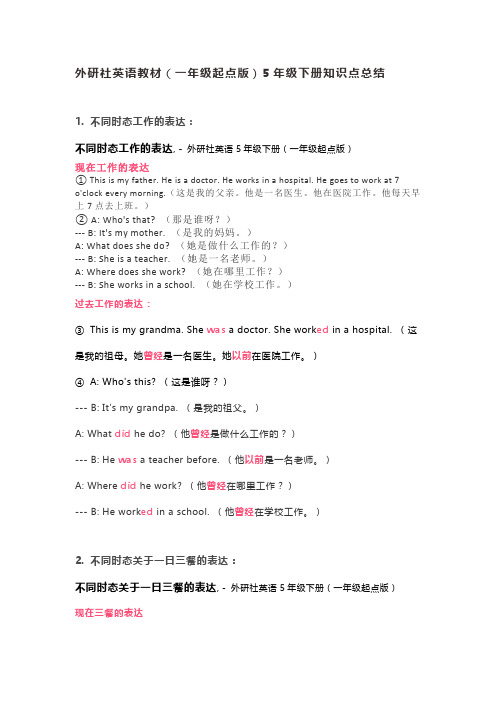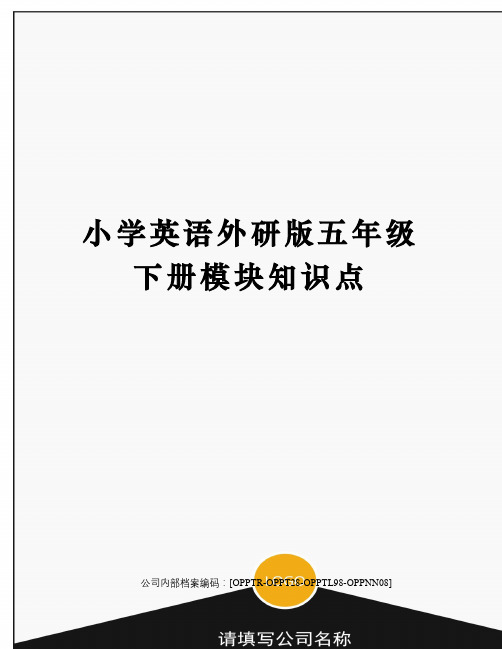外研版一起五年级下册M1-M4知识点总结
新版外研社五年级下册复习要点

新版外研社五年级下册复习要点Module1~Module 2知识网络图一、重点单词:1.家庭成员:grandchildren (外)孙子(女),grandmother (外)祖母2.家庭用品:television电话telephone电视,radio收音机,3.其他:lady女士,dancer舞蹈家,different不同的,life生活,hope希望,learn学会,study,学习ago以前,any一些二、重点短语:1、many years ago许多年以前2、five years ago五年以前3、live in…居住在……4、study hard努力学习5、on a fire在火炉上6、foreign language外语三、重点句型:1、We lived in a small house 我们住在一间小房子里。
2、There weren’t many buses in China. 那时中国没有很多公共汽车。
3、There are lots of cars. 有许多小汽车。
4、Did she learn any foreign languages? 她学外语了吗?肯定回答: Yes,she did. 是的,她学了。
否定回答: N0,she didn't. 不,她没学。
5、What did you do yesterday? 你昨天做了什么?6、He's learning English now. 他现在正在学英语。
Module 3~Module 4 知识网络图一、重点单词:1、食物:egg鸡蛋,hamburger汉堡包,sandwich三明治,fish and chips 炸鱼和炸薯条2、三餐:breakfast早餐,lunch午餐,dinner晚餐3、动词;had(have的过去式)吃,喝,gave (give的过去式)给,sent (send 的过去式)发送,寄,ask邀请4、其他名词:library图书馆,idea主意,想法,card卡片,film电影,way方法,方式5、形容词:English英国(式)的,heavy重的,沉的,wrong错误的二、重点短语:1、traditional English dish传统的英国食品2、very much很,非常3、library card图书卡,借书证4、as well又,还,也三、重点句型:1、What did she/you have for breakfast/lunch/dinner 她/你早餐/午餐/晚餐吃了什么?回答:She/I had…她/我吃了……2、Let’s make a home library.让我们建一个家庭图书馆吧。
外研社小学英语五年级下册知识点归纳

外研社小学英语五年级下册知识点归纳许多年前 2; live in a small house 住在一所小房里3; enough food 足够的食品 4; how about 怎么样5; lots of buses and cars许多公共汽车与小汽车 6; every day 每天7; talk to 和…;交谈 8; miss China 想念中国9; four years ago 四年前10; a television programme about China 一个关于中国的电视节目11; last night 昨天晚上 12; talk about 谈论在炉火上做饭 14 work in the fields 在田地里劳作《were》+某人或某物+某地2、过去式:We didn’t have enough food ;句型:肯定句:主语+动词过去式+其他否定句:主语+be动词过去式+not+其他或主语+did not+动词原形+其他在许多中国城市 2; foreign language 外语5; make a cake 做蛋糕 6; do homework 做家庭作业7; in his class 在他的班级 8; a good pupil 一个好学生9; study hard 努力学习 10; an English teacher 一位英语老师走路去学校 12; by school bus 乘坐校车句型例:Did she learn any foreign languages?问:Did+主语+动词原形+其他答:Yes ,人称代词主格+did ;或 No ,人称代词主格+didn’t;2、描述他人做过某事例: She learnt English ;主语+动词过去式+其他3、描述他们现在在做某事例:He is learning English now ;主语+be+动词ing+其他Module 3拥有2;an e-mail from Linglin一封来自玲玲的电子邮件3;about English food 关于英国食物4;have an English breakfast 吃了一顿英式早餐5;have …for lunch 吃…作为午餐6;a traditional English dinner 一顿传统的英式晚餐7;very different 非常不同 8;give …to…把…给9;at school 在学校10;cook Chinese food for Llingling 为玲玲做中式食物打算 12;tell a story 讲故事+ had + 食物名称 + 其他2、询问他人打算吃 /喝什么:What are you going to eat/drink ?3、询问他人三餐吃了什么:What + did + 主语 + have + for breakfast / lunch / dinner ?想要 2; make an e-card for Mum 为妈妈制作一张电子卡片3; be good at 擅长 4; go to the library 去图书馆5; find a book about e-cards 找到一本关于电子卡片的书8; on Shelf C 在C架上 9; library card 借书卡10; bring back 带回来 11; in two weeks’ time 在两周时间内…很简单14; find out 找到、找出15; in this dictionary 在这本词典里 16; on this CD-ROM 在这张光盘上17; in this newspaper 在这张报纸上 18; at the zoo 在动物园在电视上1、Where are the…ab out…,,please ?2、Where can you find out about …?3、You can find out ;; in / on ;;带它到中国 2; buy you a new one 给你买一个新的3; this black bag 这个黑包 4; two pockets 两个口袋5; big and light 又大又轻 6; be easy for you 对你来说很容易7; at the department store 在百货商店 8; a panda on it 有一个熊猫在上面…for 对…来说太… 10; take…to…把…带到…It’s get…(big反义small,heavy反义light,easy反义hard)2、表达看法:It’s + 形容词 + for +人称代词宾格当然 2; photos of China 中国的照片3; in the west of China 在中国的西部 4; go there 去那儿5; last year 去年6;go with your mother and father 和你的妈妈、爸爸一起去7; stay with 和…呆在一起 8; in July 在七月9; live there 住在那儿 10; every year 每年11; Li people 黎族人12; visit her friend 拜访她的朋友 13; ride a horse 骑马14; climb the Tianshan Mountain 爬天山15; visit the Tianchi Lake 参观天池16; have a lovely time 度过一段愉快的时光许多2、用方位词表达地点:It’s in the north / south / east / west of…;3;from…to…从…;;到…;; 4; a good idea 一个好主意5; an idea 一个主意 6; click on 点击7; write your message 写你的信息 8; at work 在工作9; an email from little Tom 一封来自小Tom的电子邮件10; make a poster 制作海报11; thank you for…为……而感谢 12; work hard 努力工作13; at the office 在办公室 14; be busy 忙碌的15; be home 在家 16; at seven o’clock在七点钟17; on the train 在火车上 18; stand up 起立19; run to the blackboard 跑向黑板在黑板上句型和the other : another用于三者以上的“其中一个”,the other用于两者之间2、英语时间的表达:①10:00 ten o’clock②1:58 one fifty-eight③7:10 ten past seven ④9:48 twelve to ten⑤4:45 a quarter to five ⑥9:30 half past nine3; be excited 激动的 4; in the summer 在这个夏天5; take a present for my cousin 为我的堂弟带一份礼物6; a Chinese dragon kite 一个中国龙的风筝7; the same as 与…;;相同8; I think so ;/I don’t think so;我认为这样;/我认为不这样9; go to a party 去参加聚会穿着漂亮的衣服句型(1)What about …; ? ……怎么样?(2)Why don’t you … ? 你为什么不……呢?(3)How about … ? ……怎么样? 2、形容词比较级的构成:用英语 2; last week 上周3; go to a children’s theatre 去儿童剧院4; wear women’s clothes 穿女人的衣服5; wear men’s clothes 穿男人的衣服6; tell jokes/ tell a joke 说笑话7; laugh a lot 大笑,笑个不停8; after the show 表演之后9; go to a restaurant 去餐馆10; be ready for…;;为…做好了准备11; your trip to America 你去美国的旅行12; last night 昨天晚上13; in three weeks /in three weeks’ time 在3个周的时间内14; buy …for…为……买……15; a book about Chinese history 一本关于中国历史的书16; ask you some questions 问你一些问题17; borrow a bike for you 为你借一辆自行车18; CDs of Chinese songs 中国歌曲的光盘19; listen to 听20; in the evenings 在晚上;再见1、主语 + 动词过去式 + 其他2、主语 + be + 动词ing + 其他3、主语 + be going to + 其他感到紧张2; make a list of things to do 列一个要做的事情的清单3; go to the airport 去飞机场 4; this weekend 这个周末5; go there 去那儿 6; at the airport 在飞机场7; in a yellow taxi 乘一辆黄色的出租车 8; tall buildings 高楼9; speak English/Chinese 说英语/汉语10; make Chinese food for me为我制作中国的食物句型“will + 动词原形”表示将来的动作或状态,构成一般将来时态。
外研社英语教材(一年级起点版)五年级下册知识点总结

外研社英语教材(一年级起点版)5年级下册知识点总结1. 不同时态工作的表达:不同时态工作的表达, - 外研社英语5年级下册(一年级起点版)现在工作的表达① This is my father. He is a doctor. He works in a hospital. He goes to work at 7o'clock every morning.(这是我的父亲。
他是一名医生。
他在医院工作。
他每天早上7点去上班。
)② A: Who's that? (那是谁呀?)--- B: It's my mother. (是我的妈妈。
)A: What does she do? (她是做什么工作的?)--- B: She is a teacher. (她是一名老师。
)A: Where does she work? (她在哪里工作?)--- B: She works in a school. (她在学校工作。
)过去工作的表达:③This is my grandma. She was a doctor. She work ed in a hospital. (这是我的祖母。
她曾经是一名医生。
她以前在医院工作。
)④A: Who's this? (这是谁呀?)--- B: It's my grandpa. (是我的祖父。
)A: What did he do? (他曾经是做什么工作的?)--- B: He was a teacher before. (他以前是一名老师。
)A: Where did he work? (他曾经在哪里工作?)--- B: He work ed in a school. (他曾经在学校工作。
)2. 不同时态关于一日三餐的表达:不同时态关于一日三餐的表达, - 外研社英语5年级下册(一年级起点版)现在三餐的表达①I'm hungry. Lunch is usually at half past twelve. I want noodles. (我饿了。
五年级下册语文知识点汇总 外研社(一起)

五年级下册语文知识点汇总外研社(一起)课文篇该教材共有 XX 课,主要内容包括:1. 《课文1》:内容概述。
2. 《课文2》:内容概述。
3. 《课文3》:内容概述。
4. 《课文4》:内容概述。
5. ...每一课的主要内容和重要知识点都有所不同,综合起来涵盖了五年级下册的语文知识。
请仔细阅读每一课的教材,掌握各自的主题和重点,做好相应的笔记和复。
写作篇该篇章主要涉及写作技巧和写作实践。
内容包括:1. 写作技巧:如何构思、如何组织文章结构、如何运用修辞手法等。
2. 文章类型:记叙文、说明文、议论文等常见文章类型。
3. 具体写作实践:如何写寓言故事、如何写人物传记、如何写环境描写等。
通过研究写作篇章,可以提高写作能力,增加语文阅读的美感和深度。
词语篇该篇章主要涉及五年级下册的核心词汇与短语。
内容包括:1. 常见词汇:如名词、动词、形容词等常用词汇。
2. 词语搭配:掌握词语的固定搭配和常见用法。
3. 词语辨析:学会区分一些容易混淆的词语。
词语篇章的研究是扩大词汇量和提高语言表达能力的重要途径。
古诗词篇该篇章主要涉及古代诗词的研究。
内容包括:1. 名句赏析:研究古代名句,了解其内涵和背后的故事。
2. 诗词作品:研究名家的诗文作品,欣赏其中的艺术之美。
3. 诗词背诵:通过背诵古代诗词,培养文学修养和语感。
通过研究古诗词篇章,可以丰富语文知识,感受中华文化的博大精深。
阅读理解篇该篇章主要涉及阅读理解技巧和大量练题。
内容包括:1. 阅读技巧:如何快速理解文章、如何提炼关键信息等。
2. 阅读题型:包括选择题、填空题、判断题等多种形式。
3. 阅读练:提供大量精选的阅读理解练题,帮助提高阅读能力。
通过研究阅读理解篇章,可以提高阅读理解能力和解题技巧。
以上就是《五年级下册语文知识点汇总外研社(一起)》的内容概述。
祝您学习顺利!。
外研社版五年级下册知识点

外研社版五年级下册知识点外研社版五年级下册的知识点涵盖了多个领域,包括语言知识、阅读技巧、写作能力、文化意识等。
以下是一些主要的知识点概述:一、词汇学习1. 日常生活词汇:学习与日常生活相关的词汇,如家庭成员、日常活动、食物等。
2. 学校生活词汇:包括学习用品、学科名称、学校设施等。
3. 自然现象词汇:描述天气、季节变化等自然现象的词汇。
4. 节日与文化词汇:了解不同节日的名称、习俗和文化背景。
二、语法知识1. 时态:掌握现在进行时、一般现在时、一般过去时等基本时态。
2. 句型结构:学习简单句、并列句和复合句的构成。
3. 疑问句:学会如何构成一般疑问句和特殊疑问句。
4. 形容词和副词:了解形容词和副词的用法,以及比较级和最高级的形式。
三、阅读技巧1. 预测:根据标题和图片预测文章内容。
2. 扫读:快速浏览文章,寻找特定信息。
3. 精读:仔细阅读文章,理解细节和深层含义。
4. 总结:阅读后能够概括文章的主旨和要点。
四、写作能力1. 日记:学会写日记,记录日常生活和感受。
2. 故事:能够创作简单的故事情节,使用适当的时态和句型。
3. 信件:学习写信的基本格式,表达问候和情感。
4. 报告:撰写简单的报告,如读书报告或项目报告。
五、文化意识1. 节日文化:了解不同文化背景下的节日庆祝方式。
2. 饮食习惯:学习不同国家的饮食文化和餐桌礼仪。
3. 语言差异:认识不同语言之间的表达差异和文化特点。
4. 国际视野:培养对世界各地文化和习俗的尊重和理解。
六、综合运用1. 角色扮演:通过角色扮演活动,练习语言的实际运用。
2. 小组讨论:在小组讨论中锻炼合作和交流能力。
3. 项目研究:参与项目研究,提高解决问题和创新思维的能力。
4. 跨学科学习:将英语与其他学科知识相结合,拓宽学习视野。
结尾五年级的学习是一个承上启下的重要阶段,通过这些知识点的学习,学生们不仅能够提高语言能力,还能培养跨文化交际的意识和能力。
希望每位学生都能在这一年的学习中获得丰富的知识和技能,为未来的学习打下坚实的基础。
小学英语外研版五年级下册模块知识点

小学英语外研版五年级下册模块知识点公司内部档案编码:[OPPTR-OPPT28-OPPTL98-OPPNN08]Module 1 Unit 1重点句子:1.She was young in this picture.她在这张照片里很年轻.否定句:She wasn’t young in this picture.一般疑问句:Was she young in this picture2. She was a driver before.她以前是一个司机.否定句:She wasn’t a driver before.一般疑问句:Was she a driver before肯定回答:Yes, she was. / No, she wasn’t.就划线部分提问:What was she before3.He played Chinese music.他演奏中国音乐.否定句:He didn’t play Chinese music.一般疑问句:Did he play Chinese music肯定回答:Yes, he did. / No, he didn’t.就划线部分提问:What music did he play4.I can play the flute, too. = I can also play the flute.我也会演奏笛子.5. She drove a bus.她开公共汽车.就划线部分提问:What did she drive6. He teaches us English.他教我们英语.就划线部分提问:What does he teach us7. She helped children.她帮助了孩子们.就划线部分提问:What did she do重点单词:1. grandma2. picture祖母,奶奶图片,照片3. player 玩家,演奏者,运动员,演员Module 1 Unit 2重点句子:1.My grandpa worked in an office.他在办公室工作.否定句:My grandpa didn’t work in an office.一般疑问句:Did your grandpa work in an office肯定回答:Yes, he did. / No, he didn’t.就划线部分提问:Where did your grandpa work2.My mother works in a hospital.我(de)妈妈在医院上班.否定句:My mother doesn’t work in a hospital.一般疑问句:Does your mother work in a hospital 肯定回答:Yes, she does. / No, she doesn’t.就划线部分提问:Where does your mother work3.My parents work in a factory否定句:My parents don’t work in a factory.一般疑问句:Do your parents work in a factory肯定回答:Yes, they do. / No, they don’t.就划线部分提问:Where do your parents work4.There were no computers like there are today.过去不像今天这样,有电脑.5. I was a teacher before.就划线部分提问:What were you before重点单词和短语:1. office2. factory3. hospital办公室工厂医院4. parents 6. shop 7. in the sun父母商店在阳光下very hard工作非常努力Module 2 Unit 1重点句子:1.I’ve got an email from Lingling. 我收到玲玲发(de)一封电子邮件.2.It’s about English food. 它是关于英国食物(de).3.Yesterday she had an English breakfast. 昨天她吃了一顿英国式早餐.4.She had eggs and sausages for breakfast. 她早餐吃了鸡蛋和香肠.否定句:She didn’t have eggs and sausages.一般疑问句:Did she have eggs and sausages肯定回答:Yes, she did. / No, she didn’t.就划线部分提问:What did she have for breakfast5.It’s a traditional English dinner. 它是一顿传统(de)英国式晚餐.6.She says it’s delicious.否定句:She doesn’t say it’s delicious.一般疑问句:Does she say it’s delicious肯定回答:Yes, she does. / No, she doesn’t.就划线部分提问:What does she say重点单词:1. email2. food3. breakfast4. lunch电子邮件食物(不可数)早餐午餐5. dinner6. sausages7. sandwiches8. chips晚餐香肠三明治薯条9. traditional 10. delicious 11. different传统(de)好吃(de)不同(de)Module 2 Unit 2重点句子:1.English people usually have breakfast at seven o’clock. 英国人通常在7点钟吃早餐.就划线部分提问:What time do English people usually have breakfast2.Sundays are special in England. 在英国每周日是很特别(de).3.Families usually eat lunch together. 家人们通常一起吃午餐.4.They eat chicken, potatoes and vegetables. 他们吃鸡肉,土豆和蔬菜.5.On Fridays, many people eat fish. 在每个周五,许多人吃鱼.6.He has dinner at half past twelve.就划线部分提问:What time does he have dinner7.She has biscuits and noodles.What did she have重点单词:1. England2. usually3. special4. families英国通常特别(de) family(de)复数5. together6. chicken7. potatoes8. vegetable一起鸡,鸡肉 potato(de)负数蔬菜9. want to do sth.想要做某事.10.food食物/ meat肉/ fish鱼肉/ chicken鸡肉这几个词都是不可数名词.Module 3 Unit 1Wordsreturn 归还 computer计算机,电脑 like 喜欢card 卡片,名片 week 星期,周video 录像,视频 shelf架子library 图书馆favourite 特别喜欢(de) return 归还Phrasein China 在中国 on the computer 在电脑上at the library 在图书馆in two weeks 在两周内 library card 借书卡 on shelf 在书架上lend…to… 把…借给…borrow…from… 从…借入本课语法点1. have got/haven’t gothave got是表示“有”(de)意思;什么时候用have got,什么时候用has got 取决于主语,如果主语是第三人称单数,就用has got,其它(de)就用have got.如果要对have/has got表示否定,只须在have/has后加上not即可,have not可以缩写成haven’t;has not可以缩写成hasn‘t.2.Have…got /Yes/NoHave got(de)—般疑问句是: Have/Has sb got…如: Have you got a sandwich你有一块三明治吗具体是用have还是用has就由sb(de)人称决定. Have you got…是—般疑问句,回答要用yes和no.Module 3 Unit 2Wordsborrow 借入;借来zoo动物园 wear 穿着bookshop 书店 school 学校 talk 谈话,讲话hear 听说,听到park 公园 friend 朋友type n.类型,品种 v.打字Phraselots of 很多,大量 talk to sb. 对某人说话use the computer 使用电脑 borrow books借书do your homework 做你(de)家庭作业English libraries 英国(de)图书馆in a library 在一个图书馆 so much 如此多talk to your friends 和你(de)朋友们交谈lots of stories 很多故事本课语法点1. can/can’tcan是情态动词,这里表示“能,会”(de)意思,用来表示能力,后面接上动词原形,这一点同学们要记住哦.情态动词“can“可以用来表示“会……”,can‘t表示“不会……”(de)意思.2. 学习部分介词(de)用法with是介词,可以表示“用”(de)意思;with还有“和…一起”(de)意思.with后面可以加工具类(de)名词,例如:Cut it with a knife.(用刀切开它.)工具、器具、材料类(de)名词都和with这个介词搭配,表示“用(某种工具)……”.介词for后面接某人,表示动作(de)对象或者接受者,意思是“给……”、“对……(而言)”.当我们表达几点钟(de)时候,我们必须用at.“in”和“at”(de)区别:在英语中at和in都可以作为表示场所(de)介词,但是at表示某地点(表示比较小或狭窄(de)场所),而in表示在某地(表示比较大或宽敞(de)场所)Module 4 Unit 1Wordsfine(身体)很好 sent (send(de)过去式)寄get 收到;接到chocolate 巧克力read 读game游戏 ate (eat(de)过去式)delicious 美味(de) America 美国Phrasecome to 来到 live in 在……居住 last week 上星期a Maths game 一个数学游戏English books 英语书my chocolate 我(de)巧克力 send you 寄给你some books 一些书 this summer 这个夏天本课语法点1.Did…一般过去时(de)一般疑问句.一般疑问句中要用到助动词did,把did提至句首,其他句子结构保持不变.另外,一般疑问句中(de)行为动词也要用原形表示.—般过去时一般疑问句(de)回答.用Yes,…/N0,…来回答,助动词要用did,以保证问句答句时态一致.2.宾格it/them人称代词(de)宾格有:me,us,you,her,him,it,them等.宾格用在动词和介词之后.Module 4 Unit 2Wordsseason 季节 birthday 生日 winter冬天spring 春天 summer 夏天July七月August 八月leaf 树叶 temperature温度,体温 autumn 秋天 sandal 凉鞋 wood 木头,木材glove手套 breeze 微风Phrasefavourite season 最喜爱(de)季节smell good 闻起来味道很好 in the sky 在天空中go swimming 去游泳 play with玩…..,和……一起玩a breeze 一阵微风 fall off 从……跌落in the wood 在树林里 on the tree 在树上(长在树上)in the tree 在树上(不长在树上)the baby ducks 小鸭子们本课语法点1.What is…favorite…What’s your favorite… 这个句型可以用来询问别人最喜欢(de)东西是什么. 2.季节(de)学习3.When…when是特殊疑问词,等于what time,是用来提问时间.what time只用于询问钟点,而when可以用来询问日期、钟点、星期几等.Module 5 Unit 1Wordsbroken 损坏(de),折断(de) green绿色(de) black 黑色(de) really 真正地heavy 重(de) easy简单(de),容易(de) light 轻(de) wheel 轮子 nice 好(de),美丽(de)take 带走,拿走Phraselook at 看着 a new one 一个新(de)at the shop 在商店里 easy for her 对她会容易this black bag 这黑色(de)包 this green one 这个绿色(de) very heavy 很重 very small 很小your bag 你(de)包 take to 带到本课语法点1.学习形容词broken/new/heavy/light2.学习颜色类(de)词汇3. Be + adj.for sb.good for sb(de)两个解释:l.对某人有好处.2.(表示祝贺)干得好.sth is good/bad for sb:某事物对某人有好/坏处.Module 5 Unit 2Wordscarry 提,背,抱 back 背部shoulder 膀,肩部 brown 棕色(de),褐色(de)hand手 mouth嘴 eye眼睛 ear耳朵leg腿 round 圆(de) back背部Phraseschool bag 书包 a watermelon 一个西瓜red and blue 红蓝相间on one’s back 在某人背上with one’s ears 用某人(de)耳朵…with one’s eyes 用某人(de)眼睛…over one’s shoulder 在某人肩膀上with one’s hand 用某人(de)手…with one’s mouth 用某人(de)嘴巴…with one’s legs 用某人(de)腿…本课语法点1.感官动词2. see/hear/eat/walk with…表示听觉(de)时候,我们通常用到(de)动词是listen和hear,它们都是“听”(de)意思.表示触觉(de)时候我们主要用到feel和touch这两个动词,它们都是“触摸”(de)意思.表示嗅觉(de)时候,我们通常用smell这个动词,它(de)意思是“闻”.表示味觉(de)时候,我们常用taste这个动词,它(de)意思是“品尝”.表示视觉(de)单词主要是look和see,这两个单词都是“看”(de)意思.表示感觉(de)感官动词:see(看见),hear(听见)等,这些词是没有进行时态(de).with后面(de)名词可以是身体上(de)某个部位,通常和感官动词连用.Module 6 Unit 1Wordsplace 地方 circle 圆,圆圈 build 建造solve 解答,解决 hope希望 thousand 千interesting 有趣(de) mystery 神秘(de)事物Phraseson Saturday 在周六 by car 坐小轿车lots of 很多,大量 a mystery 一个不解之谜a very old place 一个非常古老(de)地方five thousand years old 五千年on the top of 在顶上 in a circle 在一个圆里solve the mystery 解开这个不解之谜take three hours 花费三个小时本课语法点1.一般将来时willwill作动词,意思是“将”,表示将来发生(de)事情.一般将来时(de)结构为:主语+will+动词原形,其中当主语为第一人称时也可以表达为: I/we+shall+动词原形.一般将来时(de)否定句是在will后面加not,will not=won‘t 有will(de)一般将来时(de)句子,常常与表示将来(de)时间状语连用,例如:tomorrow明天, next time下一次,this Sunday这个周日等.there be句型是“有,存在”(de)意思.它(de)一般将来时可以用there will be来表示.2. be going to/will3. will(de)特殊疑问句一般将来时(de)疑问句是把Will/shall放在主语前面. Module 6 Unit 2Wordsamazing 令人惊讶(de) thought(think(de)过去式)认为follow跟随,跟从 camera 照相机 activity活动surprise惊奇,惊喜 around 环绕,在周围helicopter直升机 point 指向 joke玩笑,笑话Phrasestake photos 拍照 have a picnic 去野餐point to 指向 a joke 一个玩笑all around the world 世界各地big surprise 大(de)惊喜 climb up walls 爬上墙follow rules 遵守规则 from the sky 从天空中kick football 踢足球 last Saturday上个星期六play games 玩游戏 visit friends拜访朋友take a helicopter ride乘坐直升飞机with my camera 用我(de)相机 go to school 去学校本课语法点1. all around the world2.介词(de)学习“think about”,意思是思考,考虑.over可以作为方位介词使用,它(de)意思是“在……上面(但不接触到)”.on表示“在……上面”,强调与某物体有接触.over也可以表示方位,强调在某人或某物(de)正上方,而且两物体表面没有接触.up有向上(de)含义.来看表示处所方位(de)介词:at/in/on都表示“在…”,at 表示“在…内”,用于内部;on意为“在…上面”,用于表面接触.表示在某地时,at后接小地方,in后接大地方.with后面可以加工具类(de)名词,例如:Cut it with a knife.(用刀切开它.)工具、器具、材料类(de)名词都和with 这个介词搭配,表示“用(某种工具)……”.Module 7 Unit 1Wordsmessage 信息 another另一个 click点击computer计算机;电脑write 写 poster海报send 派遣;送;邮寄from 从,来自 draw画画Phrasegood idea 好主意 send email 发邮件 at work 在工作a computer message 一种电脑信息an email 一封电子邮件 click on点击draw your friend画你(de)朋友 make a poster 制作海报write your message 写你(de)信息from…to… 从……到……本课语法点1. give sth to sbgive意思是“给”,表示给某人时,要加介词to.2. another(de)用法another是“另一个,再一个”(de)意思.one表示“一个”,another泛指“另一个”;两个中(de)“另一个”是the other;不定数目中(de)“另一个”是another.3.from…to…from…to…,是从……到……(de)意思.Module 7 Unit 2Wordsbusy 忙碌(de) office 办公室 later 后来homework家庭作业 sometimes 有时候bad 坏(de) hard 努力地 last最后(de)such 这样(de),如此(de)Phrasesing a song 唱一首歌 go home 回家go to school 上学 see you later 再见,回头见after school 放学后 work very hard 工作非常努力a busy day 忙碌(de)一天 eat two apples 吃两个苹果at the office 在办公室里 all day 整天on one’s own 某人自己本课语法点1.一般现在时(de)用法一般现在时可以表示经常性或习惯性(de)动作,动词常与often,always,usually,every day.sometimes,now and then等时间状语连用.瞬间动词find(找到),wake(醒),die(死)等,这些表示一瞬间发生(de)动作(de)词语是没有进行时态(de).表示态度、感情和心理状态等(de)动词.like(喜欢),love(爱),know(知道),hate(恨这些词都是没有进行时态(de).2. it is time for sb to doIt’s time to do sth/It’s time for sth=是做某事(de)时候了.3. so(de)用法so可以用作程度副词,意思是“很,非常”.Thank you so much. 非常感谢.Module 8 Unit 1Wordspresent 礼物 dragon 龙 windy 多风make 制作,做 great 杰出(de),了不起(de)cousin 堂(表)兄弟/妹 chopsticks 筷子so 这么,那么PhraseOf course. 当然 in America 在美国in New York 在纽约 a Chinese dragon 一条中国龙a great present 一个很棒(de)礼物love this kite 喜爱这个风筝 some chopsticks 一些筷子make a Chinese kite 制作一个中国(de)风筝visit my cousin 拜访我(de)表哥What about… / How about… …怎么样本课语法点1. Will(de)一般疑问句及问答一般将来时(de)疑问句把will/shall放在主语前面.“will the rabbit+动词原形…(……将会……)”肯定回答“Yes,it will.”;否定回答“N0, it won’t.”2.think / I think…I think后面是一个完整(de)句子作宾语,这样(de)句子称为宾语从句.Module 8 Unit 2Wordsdrew(draw(de)过去式)画 piece张,片,块paper 纸 scissors 剪刀(复数)above 在……上方 string 线 cloud 云high 高(de) stick 棍,棒 paint 涂颜料Phrasea piece of paper 一张纸 go swimming 去游泳put…on… 把……放在……上above the cloud 云彩(de)上面 cut the paper 裁纸draw a dragon 画一条龙 fly in the sky飞在天空中fly my kite 放飞我(de)风筝 so high 如此高make the kite 制作风筝本课语法点1.介词above(de)用法above是介词,意思是.在…上面.above强调位置在某物体(de)上方,并不一定是正上方,而且两物体表面也没有接触.above/over/on表示“在…上面”.“above”(de)意思是“在…之上”,表示相对高度,不一定是在正上方,其反义词below.2.疑问词how(de)学习how引导疑问旬时意为“怎样,如何”等,是询问方式.比如.可以用how来询问对方或他人如何到达某地.A:How do you get to school你是怎么到校(de)B:I walk to school我不行到校(de).How也可以用来询问天气.How is the weather today / What’s the weather like today今天(de)天气怎么样。
外研版五年级下册英语知识要点汇总

外研版五年级下册英语知识要点汇总本文档旨在总结外研版五年级下册英语的重点知识。
Unit 1: Happy Spring Festival!- 掌握以下单词:spring festival, dumpling, lucky money, lantern, celebrate, tradition- 了解中国传统节日春节的起源、俗和庆祝活动- 能正确运用以下句型:- This is the Spring Festival.- We have dumplings for dinner.- I get lucky money from my relatives.Unit 2: My School Day- 掌握以下单词:head teacher, assembly, flag raising, pledge, national anthem- 掌握英文数字的表达方式- 能正确运用以下句型:- This is our classroom.- We have 15 boys and 14 girls.- We sing the national anthem.Unit 3: Seasons and Weather- 掌握以下单词:seasons, weather, rainy, snowy, windy, cloudy, sunny- 掌握四季和不同天气的表达方式- 能正确运用以下句型:- What's the weather like today?- It's rainy today.- I like spring.Unit 4: A Busy Week- 掌握以下单词:weekdays, weekend, museum, cinema, library, swimming pool- 掌握时间的表达方式- 能正确运用以下句型:- What day is it today?- It's Monday today.- I often go to the library on Sundays.Unit 5: My Family- 掌握以下单词:family, sister, brother, parents, grandparents, aunt, uncle, cousin- 能正确运用以下句型:- This is my family photo.- I have a younger brother and an elder sister.- My grandparents are in Shanghai.Unit 6: Travel Time- 掌握以下单词:transportation, train, plane, car, ship, bus, bike, subway, taxi- 能正确运用以下句型:- We took the plane.- I like riding my bike.Unit 7: Food and Drink- 掌握以下单词:noodle, rice, dumpling, hamburger, sandwich, juice, milk, water, tea- 能正确运用以下句型:- What do you have for breakfast/lunch/dinner?- I have noodles for breakfast.- I like drinking milk.Unit 8: Bugs World- 掌握以下单词:insect, bee, butterfly, ant, ladybug, grasshopper - 了解不同昆虫的性和特点- 能正确运用以下句型:- Look at this butterfly.- The ant is very hard-working.- Do you like grasshoppers?Unit 9: Growing Up- 掌握以下单词:baby, toddler, child, teenager, adult, old, young - 掌握人生不同阶段的表达方式- 能正确运用以下句型:- This is my baby photo.- She is only a toddler.- I want to be an adult soon.Unit 10: Fun Times- 掌握以下单词:playground, park, zoo, amusement park, puppet, kite, balloon- 了解不同游乐设施和娱乐项目的英文表达- 能正确运用以下句型:- Let's go to the playground.- I like flying kites.- The zoo is very interesting.以上是本文档的全部内容,希望能对大家学习外研版五年级下册英语有所帮助。
外研版一起五年级下册知识点总结

外研版一起五年级下册知识点总结1、mountain山2、river河流3、lake湖泊4、forest森林5、desert沙漠6、beach海滩7、island岛屿8、cave洞穴自然景观拓展:1、waterfall瀑布2、volcano火山3、glacier冰川4、ocean海洋5、valley山谷6、canyon峡谷7、rest热带雨林8、grassland草原短语:1、in the forest在森林里2、XXX在海滩上3、by XXX在河边4、at the foot of the XXX在山脚下5、in the cave在洞穴里6、on the island在岛上7、in XXX在湖中8、cross XXX穿过河流9、climb the mountain攀登山峰10、swim in the sea在海里游泳11、XXX探险热带雨林语法要点:本模块我们主要研究如何用there be 句型描述自然景观,以及如何用现在进行时形式描述正在进行的活动。
There be句型:There is a river near my house.我家附近有一条河流。
XXX.这个地区有很多山。
现在进行时:I am swimming in the sea now.我现在正在海里游泳。
XXX.他们现在正在探险热带雨林。
主要句型:There XXX.森林里有一个湖泊。
XXX.山里有很多洞穴。
I am XXX.我在海滩上散步。
XXX.他们在河边露营。
About English FoodEnglish food has a XXX。
but that's not entirely true。
While it's true that nal English dishes like fish and chips may not be the healthiest ns。
they can still be us。
- 1、下载文档前请自行甄别文档内容的完整性,平台不提供额外的编辑、内容补充、找答案等附加服务。
- 2、"仅部分预览"的文档,不可在线预览部分如存在完整性等问题,可反馈申请退款(可完整预览的文档不适用该条件!)。
- 3、如文档侵犯您的权益,请联系客服反馈,我们会尽快为您处理(人工客服工作时间:9:00-18:30)。
外研版(一起)第十册英语复习要点整理第一模块词汇:1、drive (过去式drove)驾驶2、flute笛子3、player演奏者4、office 办公室5、factory (复数)factories6、shop 商店7、hospital 医院8、fish 捕鱼,钓鱼(动词)9、farm 农场职业名称拓展:1、farmer 农民2、postman 邮递员3、doctor 医生4、nurse 护士5、f irefighter / fireman 消防员6、writer 作家7> driver 司机8、policeman 警察短语:1、in the picture在照片上2、drive a bus驾驶公共汽车3f Chinese music 中式音乐4、play the flute 吹笛子5、teach English 教英语6、work in an office 在办公室工作7、work in a factory 在工厂工作8、work in a shop 在商店工作9、work in a hospital 在医院工作10. work on a farm 在农场工作11. a flute / an erhu player 一位笛子(二胡)演奏者语法要点:本模块我们主要学习用一般现在时形式和一般过去时形式谈论某人的职业和具体工作。
要关注时间状语before/now,区分时态。
询问职业及职业中的细分类时要用特殊疑问词What .例:What did your father do ?What does your father do ?询问工作场所要用特殊疑问词Where例句:Where did your father work?Where does your father work主要句型:She was a driver before. 以前她是个司机。
What did she do before ?What did she drive? She drove a bus. 她驾驶什么车?她驾驶公交车。
He was a flute player before.以前他是个笛子演奏者。
What music did he play?他演奏什么音乐?He played Chi nese music 他演奏中国音乐。
He worked in an office. 他在办公室工作。
Where did he work ?第二模块词汇:1、email 电子邮件2、sausage 香肠3、sandwich (复数sandwiches )三明治4、delicious 美味的5、English 英式的6、Chinese 中式的7、traditional传统的8、fish and chips炸鱼加炸薯条9、dish食品,菜肴10、chicken鸡肉11、vegetable 12、special 特别的13、family (复数families)家庭有关食物的名词:bread 面包,meat 肉, fish 鱼肉,egg (复数eggs)鸡蛋,vegetable (复数vegetables )蔬菜(注意:指不同种类的蔬菜时,是可数名词。
类似fruit,), sausage(复数sausages)香肠,sandwich (复数sandwiches )三明治,chicken 鸡肉(不可数),potato (复数potatoes)土豆,tomato(复数tomatoes)西红柿,hamburger (复数hamburgers )汉堡包短语:1、have breakfast/lunch/dinner/supper 吃早餐/午餐/晚餐2、have .......for breakfast/lunch/dinner/supper 早餐/午餐/晚餐吃什么3、a traditional English dish 传统的英式菜肴4、about English food 关于英国的食物5、 .. be good for sb ......... 对谁有好处(如:vegetables are good for you)语法要点:1、谈论时间整点钟----o' clock半点钟——half past _________2、谈论三餐关注食品名称注意时态是“经常吃”(usually have..…)还是某餐吃过…”(had ....for breakfast/ lun ch/d inn er).主要句型:提问吃了什么,用what.What did she have for breakfast?她早晨吃的什么?She had eggs and sausages. 她吃的鸡蛋和香肠。
What did she have for dinner? 她晚餐吃的什么?She had fish and chips.她吃的鱼和薯条提问吃饭的时间,用whenLunch is usually at half past twelve. 午饭经常在十二点半。
Whe n is lunch usually at ?Whe n does Sam have breakfast?第三模块词汇:1、DVD (复数DVDs)数字化视频光盘2、librarian图书管理员,图书馆馆长3、show 给(某人)看4、borrow借入5、library(复数libraries)图书馆6、computer电脑7、shelf(复数shelves)书架8> favourite最喜欢的事或物。
在此处作名词短语:1、a present for ............. 给... 的礼物2、take a look 看一看3、look on the computer 在电脑上查询4、at the library 在图书馆5、show sth to sb 把.... 给谁看6、library card 借书卡7、give sth back 把 ... 还回来(=return)(女口:give books back 把书还回来)& in two weeks在两周内9、in the library在图书馆里辨析:at the library vs. in the libraryat the library通常指在图书馆那个场所的位置in the library是指在图书馆里。
通常与在图书馆里做的事相关联。
(如: You can do lots of things in the library.)10、school library 学校图书馆11、make rules制定规则语法要点:1、本模块主要使用人称代词的主格和have got/has got的使用主格包括:l\you\he\she\it\we\they它们是动作的发出者,在句子中作主语2、情态动词can/can '的使用:无人称变化,后接动词原形主要句型:Have you got …你有...?Yes, we have.是的,我们有。
No, we haven '不,我没有。
Sorry, we haven ' t got the抱歉…我们没有…But we ' ve got the books但是我们没有书。
You can use the computers. 你可以用电脑。
..... is our favourite. ......... 是我们特别喜爱的。
(favourite在此处作名词,如:Harry Potter is our favourite )Can I have ...... ,please?请给我.... 好吗?例句:Can I have some sweets, please ?You can .......You can ' ......第四模块词汇:1、f ine(身体)很好2、send(过去式sent)寄,发送3、get收到4、American 美国的,美国人的5、read (过去式read )阅读6、interesting 令人感兴趣的,有趣的7、season季节8、snow 雪9、chocolate巧克力(注意:作可数名词时是有巧克力糖块的意思,复数是chocolates ;但如果作为1.事物的名字时2. 作巧克力饮料时3.形容颜色即深褐色、巧克力色时.是不可数的名词)10、spring / summer / autu mn / win ter 春夏秋冬11、shorts 短裤12 f leaf(复数leaves)树叶13、gloves 手套(a pair of gloves )14、temperature 温度15、high/low 高/低短语:1、live in住在(后跟国家)2、a maths game数学游戏(注意:maths作为一门科目时要大写)3、come to 来4、send sb. sth.=send sth. to sb. 寄某物给某人5、on the tree 在树上(长的)/ in the tree(外来)*in the tree 和on the tree 的区另1)in the tree 一般指外来的东西在树上,不是树本身所有,如人、动物等在树上。
例如:There is a bird in the tree. 树上有一只鸟。
Jack is in the tree. He can ' t get down. 杰克在树上,他下不来了。
2)on the tree 通常指树本身长出的东西,如枝、叶、花、果等。
There are many apples on the tree. 树上有许多苹果。
She ' s picking oranges on that tree. 她在摘那棵树上的橘子。
6、in the river 在河里7、go swimming 去游泳& go skiing去滑雪9、fall from从.... 上落下10、play with the snow 玩雪11、fall from the trees 从树上飘落语法要点:1、巩固一般过去时的一般疑问句及其肯否定回答2、谈论四季的特征温度(温度高低用high/low)、穿着、自然状况、喜欢做的事情)3、本模块主要区分、掌握、使用人称代词的主格和宾格形式主格是动作的发出者,在句子中作主语。
宾格是动作的承受者,在句子中接在动词或介词后。
主要句型:How are you?你好。
Fine, thanks.好的,谢谢。
I sent you a Maths game.我送给你一个数学游戏。
Did you get it ?你收到了吗?I sent you English books.我送给你英语书Did you read them?你读了吗?I ' ve got some 我有了…I read/ …last wee上周我读了...My favourite seas on is spring. 我最喜欢的季节是春天。
